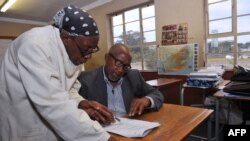JOHANNESBURG —
In South Africa, the generation of students born after 1994, when Nelson Mandela became the country's first democratically elected black president, has been celebrated for its success in the end of high school exam, called the “matric.” This year's pass rate was nearly 74 percent, 13 points higher than three years ago. But now some students struggle to find a spot in a university. Last year, one mother died in a stampede at the University of Johannesburg when a throng of students scrambled to enroll. This year, universities have been more careful.
To avoid another tragedy, the University of Johannesburg resorted to a very strict “no walk-ins” policy. Nicholas Manyini, a security guard, says he has been turning away a regular trickle of hopeful applicants. “The stampede from last year was hectic and had an effect on the institution. This alternative yielded good results. Of course people get frustrated because they call in large number and it can only assimilate the number that can be picked up,” he explained.
Fresh graduate Alilea is waiting outside the campus doors. She says she is scrambling to find a spot somewhere to continue her studies. “I thought I wasn't going to be able to qualify and all that, but I did actually," she said. "I know I applied late and all that, but then... they have to have space for us! I need to go to school! I need to study!”
Having more students pass the matric doesn't necessarily mean that more will get a chance at further study. Nor does it mean that the general level of students is improving. Experts quoted in the local press say the standards required to pass the matric keep on being lowered.
At University of the Witswaterstrand, one of the most selective of the country, every college is full, except for a few spots in the education program. Carol Crosley, who is in charge of admissions, says her school cannot accept more students.
“Because we've got a static number of spaces available, it becomes that much more competitive. So, in the past, when students may say they managed to get into, let's say, engineering with 60 percent for most of their courses, we are finding now that the average student requires 70 percent to get in engineering,” Crosley stated.
South Africa's minister for higher education has called for pupils to try their luck in vocational colleges that may lack the prestige of universities, but provide training for qualified workers that the country sorely lacks.
To avoid another tragedy, the University of Johannesburg resorted to a very strict “no walk-ins” policy. Nicholas Manyini, a security guard, says he has been turning away a regular trickle of hopeful applicants. “The stampede from last year was hectic and had an effect on the institution. This alternative yielded good results. Of course people get frustrated because they call in large number and it can only assimilate the number that can be picked up,” he explained.
Fresh graduate Alilea is waiting outside the campus doors. She says she is scrambling to find a spot somewhere to continue her studies. “I thought I wasn't going to be able to qualify and all that, but I did actually," she said. "I know I applied late and all that, but then... they have to have space for us! I need to go to school! I need to study!”
Having more students pass the matric doesn't necessarily mean that more will get a chance at further study. Nor does it mean that the general level of students is improving. Experts quoted in the local press say the standards required to pass the matric keep on being lowered.
At University of the Witswaterstrand, one of the most selective of the country, every college is full, except for a few spots in the education program. Carol Crosley, who is in charge of admissions, says her school cannot accept more students.
“Because we've got a static number of spaces available, it becomes that much more competitive. So, in the past, when students may say they managed to get into, let's say, engineering with 60 percent for most of their courses, we are finding now that the average student requires 70 percent to get in engineering,” Crosley stated.
South Africa's minister for higher education has called for pupils to try their luck in vocational colleges that may lack the prestige of universities, but provide training for qualified workers that the country sorely lacks.




